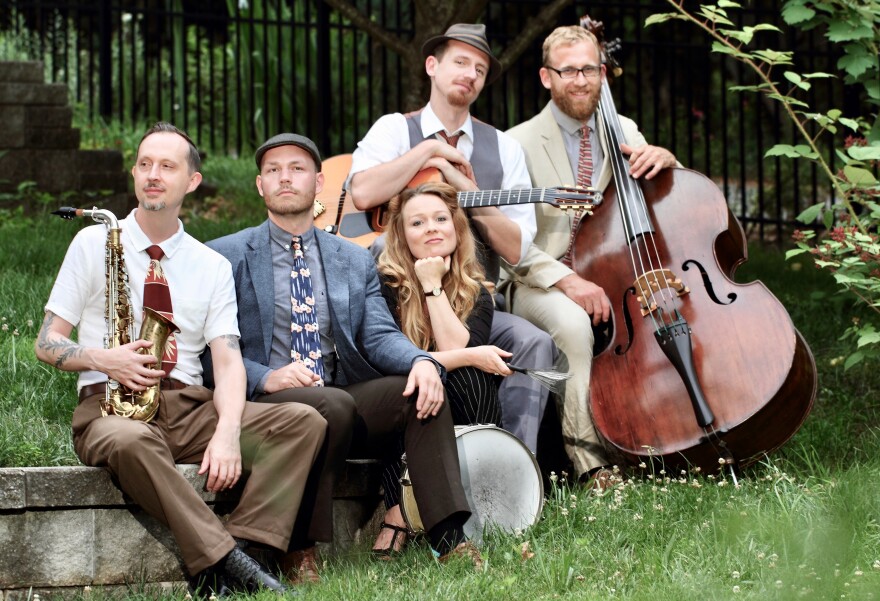When people describe a musician as a throwback artist, they’re usually hearing sounds and influences from two to four decades ago. To trace where Whitney Moore is coming from with her new music, you have to wind the calendar back nearly a century.
“You get to the ’50s and late ’40s and ’60s, and jazz becomes a thing for the elites,” Moore said. “But the ’20s through ’40s, it was still the music of the people and it served a really sweet purpose, to transmute their suffering or cheer them up.”
Moore’s new band is Queen Bee and the Honeylovers, and their debut album is simply titled “Asheville.” The music comes from personal and societal nostalgia for Moore, a fourth-generation native of Asheville.
Queen Bee and the Honey Lovers celebrate their new album, “Asheville” with a performance April 27 at Isis Music Hall, in Asheville.
“For me, it just really makes me feel rooted where I am and keeps the events of modern day in perspective, remembering what we’re standing on and what our ancestors went through and overcame,” she said. “And while there’s a lot of work that needs to be done, we have a lot to be grateful for, and they worked hard to give us the world that we have.”
Moore grew up in a musical family—her father still sings and plays drums. Moore lived in Spain in her early 20s and, later, in Mexico, grounding her in Spanish, Latin and flamenco music.
“There’s something very soothing and cathartic to me about the bittersweetness and willingness to embrace the darkness that you find in Latin music and flamenco music,” she said. “I’m a very cheerful person, in general, in life, so it was nice to go a little deeper and darker in my artistic persona.”
Over the years, Moore has suffered five bouts of typhoid. The most recent of which robbed her of her singing voice for a year. That episode and the tug of family brought Moore back to Asheville eight years ago.
She joined a flamenco group here, but that group disbanded around the time her son was born, at the end of 2016. For reasons she’s only beginning to understand, the confluence of those events drew Moore to the dawn of jazz.
“I was kind of just at this restart button in my career and I found the nostalgia so appealing,” she said. “I found solace in the innocence of early jazz.”
Moore wrote stories as songs, narratives drawn from Appalachian folklore and personal history. “The Legend of Zelda Fitzgerald” is a mirror for Moore’s own marriage and the postpartum depression she experienced after the birth of her son.
“I felt a lot of connection and kinship with women in the past who were pathologized and committed to mental hospitals,” Moore said. “As I was studying a lot of the characters here from Asheville back in its golden era, back in the jazz age, (Fitzgerald’s) story really jumped out at me. I could really see myself in her.
“Logan and Moore” is about her grandfather’s tailor shop on Pack Square. “Beacham’s Curve” recalls her grandfather’s experiences riding the trolley. And “Helen’s Bridge” is drawn from a legendary Asheville ghost story.
Moore is also deliberate about singing in a style reminiscent of the era—borrowing qualities she found in the voices of Billie Holiday, Ella Fitzgerald, Blossom Dearie, Erykah Badu.
“I very intentionally created my own kind of stylized character, if you will,” she said of her Queen Bee voice. “There’s kind of a flattening in the back of the tongue to give it that kinda early jazz sound and we toyed on the album of actually using, how much reverb to use that sounded the most (of that) period.”
More than a sonic callback to yesteryear, Moore sees her music in a contemporary social context.
“I feel like if I’m going to write nostalgic music, I need to acknowledge the good old days weren’t good for everybody, “ she said. “I found it soothing to be reminded what our ancestors suffered through and persevered over. It’s easy to get on social media and believe things have never been worse, but I don’t think our ancestors would agree with that. Our ancestors suffered some pretty terrible things, and he we are.”





